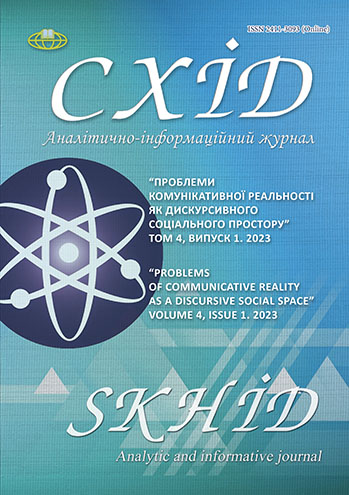The post-truth discourse and the politics of memory in the contemporary media spaces
DOI:
https://doi.org/10.21847/2411-3093.2023.4(1).275699Keywords:
history of Ukraine, information war, information warfare, historical memory, history policy, politics of memory, post-truth, propagandaAbstract
This article concerns the emergence, definition, and characteristic of the phenomenon of “post-truth” and how its characteristics are used in connection with historical narratives by various political forces for their own goals. The article’s goal is to identify how historical narratives are used by the spreaders of post-truth for various results in domestic and foreign policy, or, in the case of the post-truth spreader being a contesting politician vying for power, for electoral support. The research utilizes historical-narrative and historical-comparative methods, alongside methods of discourse and content analysis. After reviewing the literature, it is observed that from the point of view of historical politics, the methods of spreading the post-truth pose a tempting prospect of ensuring the ideological unity of the nation (or a part of it). The creation of an ideological and informational climate in which history consisted only of the heroism of "Us" and the various affronts and capture of “our old territories” by "the Other" contributes to internal stability. However, such historical politics, while useful in an “information bubble” in domestic policy, can be easily exposed and deconstructed by the neighboring powers decried as “the Other”, blamed for various historical grievances (in the case of a reigning regime using post-truth historical narratives), or by political rivals debunking false claims (in the case of a contesting political force using such narratives in a democracy). The post-truth relies on charisma and cognitive bias, rather than specific historical knowledge, and can be used to strengthen existing political support, more so than converting others. Post-truth accelerates the involvement of media consumers and the growth of their confidence in the correctness of the ideology. However, regardless of its utilitarian positives for political forces, a choice in favor of post-truth is a voluntary choice in favor of misinformation, anti-intellectualism and deception.
Downloads
References
Arkhipov, I. (2019, January 7) V parke «Rossiya — moya istoriya» na VDNH zakleili daty, svyazannye s «Nord-Ostom», Beslanom i «Kurskom» [In the park "Russia is my history" at VDNKh, the dates related to "Nord-Ost", Beslan and "Kursk" were painted over]. The In-sider. [online]. https://theins.ru/news/134966 [Ac-cessed 20 November 2022].
Bakhtin, M. (1981). The Dialogic Imagination: Four Essays. University of Texas Press.
Černín, D. (2018). Role historie v době post-faktické. Člověk v postfaktické společnosti. Hradec Králové: Philosophical Faculty, University of Hradec Králové. DOI: https://doi.org/10.26806/fd.v11i1.302.
D’Ancona, M. (2017. Post-truth: The new war on truth and how to fight back. Random House.
Knispel, S. (2022). Fact-checking Putin’s claims that Ukraine and Russia are “one people”. University of Rochester, 3 March 2022 [online]. Available at: https://www.rochester.edu/newscenter/ukraine-history-fact-checking-putin-513812 [Accessed 20 November 2022].
Krekó, P. (2019). Hungary: a laboratory of illiberalism and post-truth. The Vienna Institute for International Economic Studies. 18 Febryart 2019 [online]. Availa-ble at: https://wiiw.ac.at/hungary-a-laboratory-of-illiberalism-and-post-truth-e-416.html [Accessed 20 November 2022].
Kuzmanovic, J. (2022). Orban Condemned by Neighbor Croatia Over Territorial Remarks. Bloomberg Europe Edition. 10 May 2022 [online]. Available at: https://www.bloomberg.com/news/articles/2022-05-10/croatia-condemns-hungarian-leader-for-territorial-aspirations [Accessed 20 November 2022].
McIntyre, L. (2018). Post-truth. MIt Press.
McLaughlin, E. C. (2021). Trump characterizes Robert E. Lee as a unifier and premier war strategist. Here’s what history shows. CNN, 12 September 2021 [online]. Available at: https://edition.cnn.com/2021/-09/12/us/trump-robert-e-lee-statue/index.html [Ac-cessed 20 November 2022].
Mieliekiestsev, K. (2020). The “Post-truth era” and its effects on public perception of Georgian and Ukrainian history. 15th International Silk Road virtual conference. Conference Proceedings (Silk Road 2020) = აბრეშუმისგ ზისმე-15 დისტანციურისაერთაშორისო კონფერენცია. Silk Road Conferences. October 09–10. Tbilisi, Georgia, 2020. pp. 24–32.
Nally, D. (2022). Theorising post-truth in the COVID era. Journal of Educational Change, Vol. 23, p. 277–289; doi: https://doi.org/10.1007/s10833-022-09457-3.
Skillen, D. (2019). Post-Truth and Normalised Lies in Russia. Public Service Broadcasting and Media Sys-tems in Troubled European Democracies, eds. E. Połońska, C. Beckett, Palgrave Macmillan, p. 359–382.
Smeltz, D., Wojtowicz, L. (2022). Russians think they’re engaged in a heroic struggle with the West. The Washington Post, 14 April 2022 [online]. Available at: https://www.washingtonpost.com/politics/2022/04/14/russia-public-opinion-putin-ukraine [Accessed 20 November 2022].
Sismondo, S. (2017). “Post-truth?” Social Studies of Science, Vol. 47, Issue 1, p. 3–6; doi: https://doi.org/10.1177/0306312717692076.
Wise, K., Bolls, P. D., Schaefer, S. R. (2008). Choosing and Reading Online News: How Available Choice Affects Cognitive Processing. Journal of Broadcasting & Electronic Media. Vol. 52, Issue 1, p. 69–85; doi: https://doi.org/10.1080/08838150701820858.
Downloads
Published
How to Cite
Issue
Section
License
Copyright (c) 2023 Кирило Мєлєкєсцев

This work is licensed under a Creative Commons Attribution-NonCommercial-NoDerivatives 4.0 International License.
1. Authors bear responsibility for the accuracy of facts, quotations, numbers and names used.
2. Manuscripts are not sent back.
3. The publisher does not always agree with the authors' opinion.
4. The authors reserve the right to authorship of the work and pass the first publication right of this work to the journal under the terms of a Creative Commons Attribution-NonCommercial-NoDerivatives 4.0 International License. This license allows others to distribute (copy) the published work for non-commercial purposes, provided there is mandatory attribution to its authors and a link to the first publication in our journal.
5. The authors have the right to conclude separate supplement agreements that relate to non-exclusive work distribution in the form in which it has been published by the journal (for example, to upload the work to the online storage of the journal or publish it as part of a monograph), provided that the reference to the first publication of the work in this journal is included.

